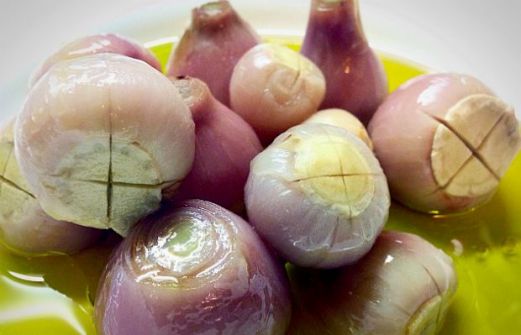Vrovios, vrovioi in plural, is the Cretan name of the flowering plant that is scientifically called muscari comosum and is abundant throughout Greece.
We find it with the names Volvos, Kalogries, Skordoulakas, Vrovios, Agrios Manis, Kourkoutselia, Kremmidoules, Skylokremmida, Askordoulakas.

It is a medicinal plant known since antiquity. Hippocrates recommended it against the cessation of milk and uterine bleeding. He also believed that he was helping in the conception. Dioskourides wrote that in the form of a poultice it is good for the stomach and sprains, gout and joint pain. He also wrote that the bulb, alone or in combination with other herbs is good for dandruff, skin spots, hemorrhoids, freckles etc. The poet Theocritus praises it as food of the villagers.
From ancient times the bulbs were believed to cause sexual desire and arousal. This view has existed for thousands of years. The same thing was believed by the Byzantine doctors and logographers but also by the folk medicine of the 19th century.
Endemic to Greece and the Middle East, they have been cultivated since Greek and Roman times and in England since 1576.
The bulbs have been eaten by the Greeks since antiquity. In fact, it is characteristic that Greek cuisine uses them in the same way, thousands of years now, roasted and seasoned in vinegar, exactly as Dioskouridis describes. The flowers of the bulb are used in omelets.

In Crete, bulbs are a favorite food. They were used for their diuretic properties and to help constipation and also considered to help lower cholesterol. They act as a tonic, increase appetite, are beneficial for weakened immune systems, and treat inflammation of the liver. In a patch they are used for external pains from swelling, rheumatism, abscesses and sprains.
They are collected for consumption in the spring, around Easter, the time varying depending on the region. They are easily located by their characteristic flowers and the bulbs are extracted from the ground. The bulbs are harvested, as well as the white stems that remains after the green leaves are cut.
The sprouts with their flowers are eaten fried in omelets. The bulbs are boiled at least twice to lose their natural bitterness and served with oil and vinegar or cured as an amazing pickled meze.
There are countries, such as England, that consider bulbs poisonous. In Crete, however, the bulbs have been eaten cooked for millennia without any adverse side effects. However, they should be consumed in moderation, because they cause gas in the digestive system.

